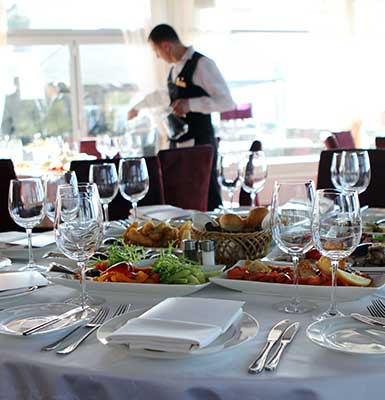How to Cater to These 4 Common Special Dietary Restrictions

When you’re planning an event, you’ll ultimately be faced with the challenge of planning an inclusive menu for your guests. Most times, at least a few guests will have dietary restrictions, and maybe even food allergies. This can make the task daunting, and sometimes even frustrating. But, it’s not an impossible task.
In this guide, we’ll cover some of the most common types of dietary restrictions and food allergens, and how to create a menu that will keep your guests happy.
1. Gluten-Free
There are different reasons why people may be gluten-free. For example, some adopt a gluten-free lifestyle to lose weight while others may need to remove gluten from their diet because of an intolerance. Additionally, people who have been diagnosed with celiac disease must cut out gluten in order to avoid serious health complications.
No matter the reason for cutting out gluten, it’s important that you’re able to accommodate any gluten-free requests. A few examples of common gluten-free foods you can incorporate into your menu include lentils, quinoa, rice, and potatoes. Please note that sometimes lentils can come into contact with gluten-containing grains during food processing, so be sure whatever you purchase is labeled gluten-free. There are also specific gluten-free options, such as substituting standard gnocchi for cauliflower gnocchi, or using spaghetti squash or zucchini for pasta instead of standard refined or whole–wheat pasta.
Again, there are plenty of options out there—just be sure to look for the gluten-free label on everything you purchase. This not only ensures the item is naturally free of gluten, but also has avoided cross-contact during food processing.
2. Dairy-Free
There might also be people attending the event who are lactose intolerant or have a mild sensitivity to dairy products. Fortunately, because there are so many people who are lactose intolerant, there are plenty of plant-based alternatives on the market for butter, cheese, and milk. For example, if you’re making a cheesecake, you could use coconut cream cheese instead of standard cream cheese. Plant-based alternatives usually taste very similar to the product they’re substituting and won’t affect the quality of the dish.
Again, it is helpful to have several items on the menu that do not contain dairy. You may want to have one or two dairy-free options for your guests, and make sure you mark them clearly.
3. Vegan
Lots of people have made the decision to go vegan. Vegan is not the same as vegetarian. Vegetarians don’t eat meat, while those who are vegan will not consume any product derived from animals, like eggs, milk, honey, cheese, and yogurt.
Agan, there are plenty of plant-based options you could use to replace meat, eggs, milk, and other animal derived foods. For example, if a dish would normally include honey, you could replace that with maple or agave syrup—both are sourced from plants, not animals. Tofu and mushrooms are also great meat alternatives for vegans and vegetarians.
It’s important to note, however, that many plant-based meat alternatives are derived from soy, so be sure your vegan guests don’t have soy allergies or sensitivities. If there are, you’ll want to find products made with pea protein. Additionally, those with soy allergies are typically not allergic to other types of legumes, so you could most likely find plant-based meat alternatives made from beans and brown rice.
4. Religious or Ethical Dietary Restrictions
You may also have to navigate some religious dietary restrictions as well. A few examples include:
- Those who practice Islam are only allowed to eat “Halal,” or lawful, foods. Eggs, vegetables, and fruit are acceptable, but you must make sure any meat you serve them is labeled as certified Halal. Some “Haram,” or forbidden foods include alcohol, vanilla extract, animal fats, gelatin, pork, crustaceans, and non-certified Halal meat.
- Most people who practice Hinduism follow a lacto-vegetarian diet, which means that they mostly avoid meat and most animal-derived foods, although some Hindus may eat eggs. There are also certain situations where chicken and lamb might be acceptable. Other foods that Hindus avoid include garlic, coconut, onions, milk, or ghee. When offering plant-based alternatives, be sure that it is not made from or contains coconut milk. Also, keep in mind that not all those practicing Hinduism make the same dietary choices—when creating RSVPs for your event, be sure you have a section where your guests can add the foods they’re restricted from eating.
- People who follow Judaism are typically only allowed to eat food that is considered kosher. This means that they are not allowed to eat pigs or birds, but they might be allowed to eat duck, geese, turkey, and chicken. They are not allowed to eat shellfish, and you should make sure that food derived from birds does not contain any blood.
If you are concerned that you may have to navigate religious restrictions, you may want to do a vegetable-heavy entrée and again, ask for specific dietary restrictions from anyone who is coming to the event. Remember that if you need to follow religious restrictions, plates and utensils cannot come into contact with restricted items either.
How to Handle Food Allergies
In addition to dietary restrictions, you may also have to navigate food allergies. Some of the most common food allergies include nuts, wheat, soybeans, and eggs.
A few tips you should follow to keep people safe include:
- Make sure you wash your hands thoroughly with soap and water in between preparing meals.
- Use separate utensils, cookware, and countertops for preparing different types of food.
- If there is limited countertop space, wash the countertop between preparing different meals.
- Encourage people to wash their hands before they pick up their food.
- Make sure everything is labeled appropriately.
Plan Ahead With Help from Chef Raymone Catering
Creating a menu that is safe for everyone can be challenging, and that is why event planners should rely on a professional catering company for help. At Chef Raymone, we offer professional, affordable, and customized catering services to clients in Michigan.
Give us a call today to learn more about our services and menu options, or to request a quote.








